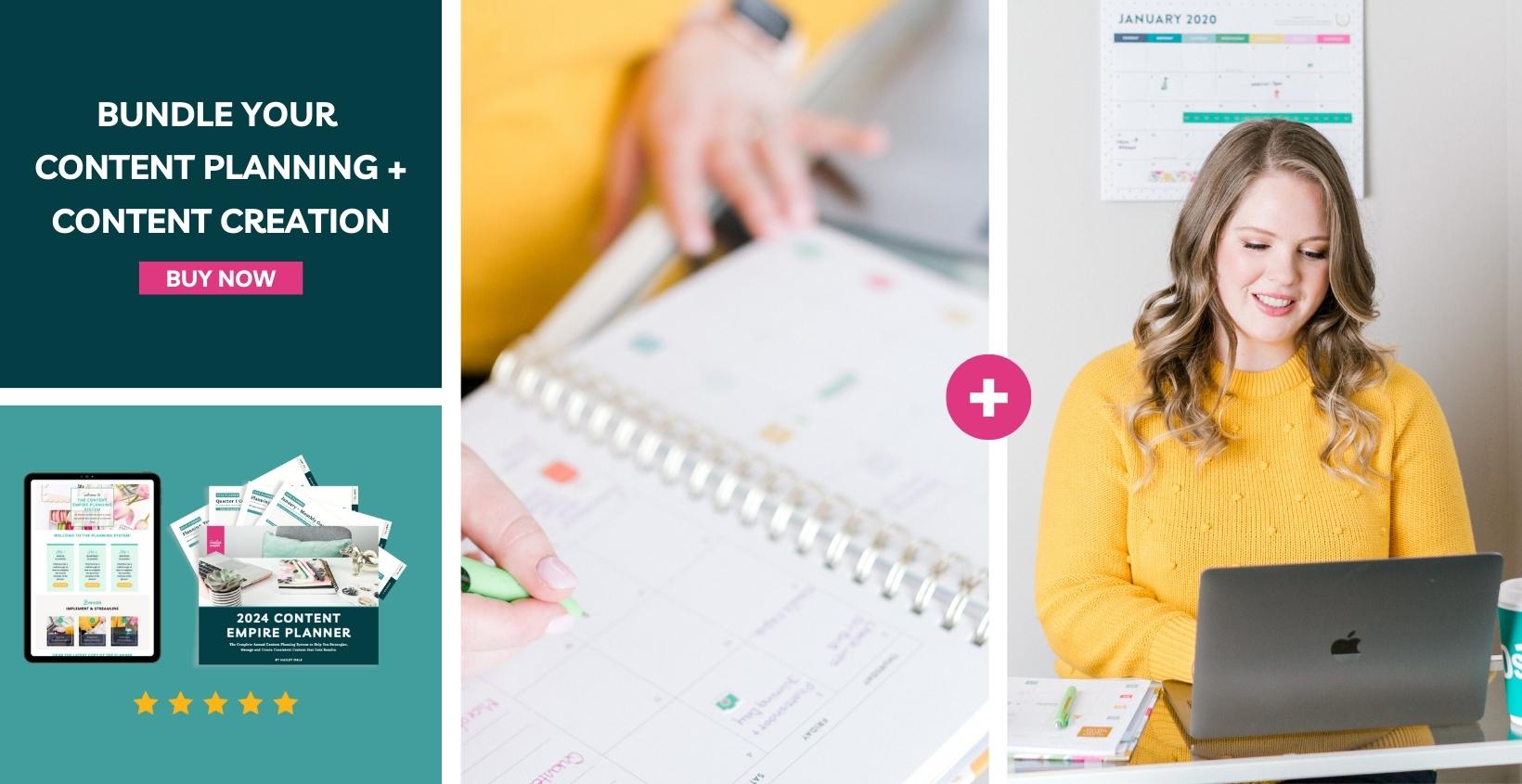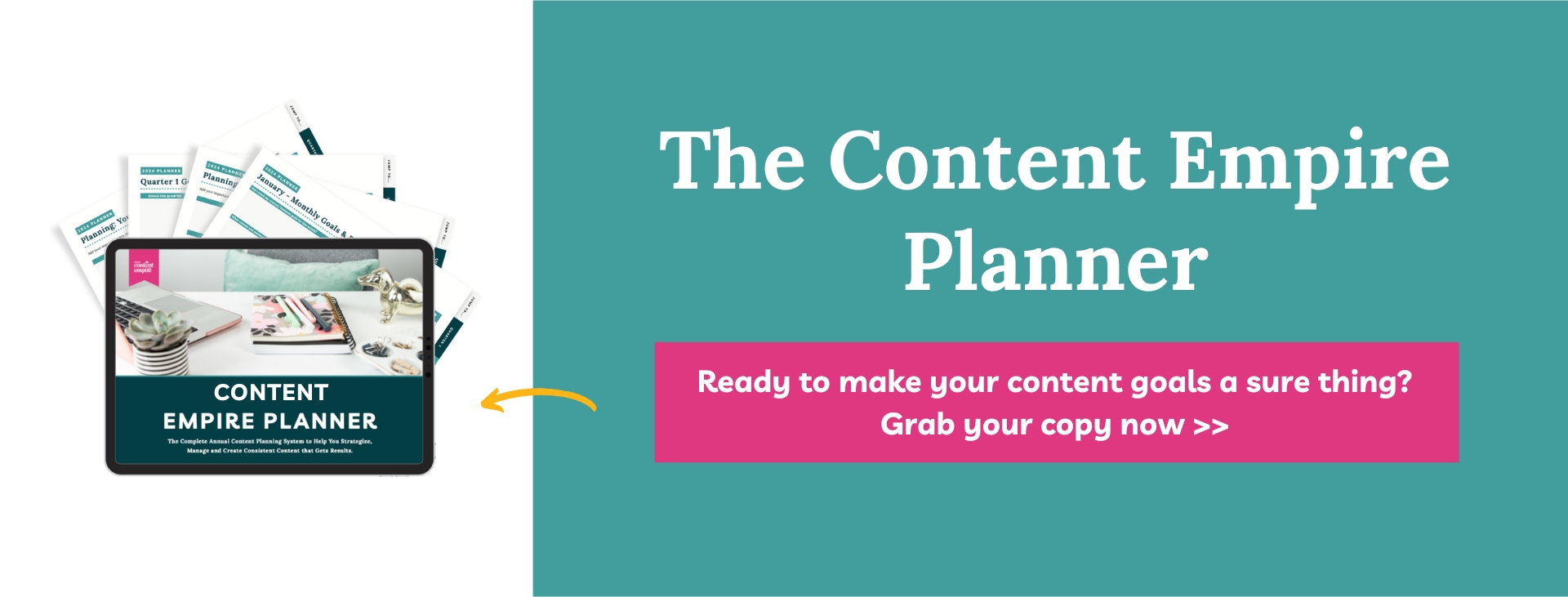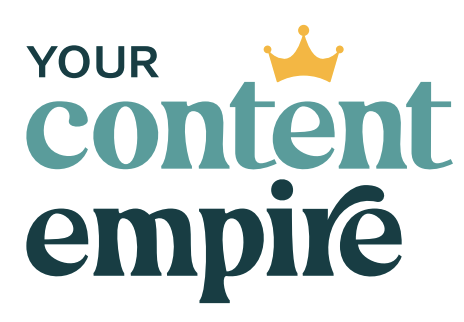Are you feeling stuck in business or uninspired by your content going into 2024?
There have definitely been (more than) a few moments in my business where I questioned whether or not it was worth it.
Times when I felt like I was working all the time, stuck at my desk, with no end in sight.
Other times when I just felt disillusioned with the entire industry, a mix of boredom, frustration and something close to hopelessness.
I’ve found that the remedy is almost always: (1) Stepping away and taking a real break for a day or two; (2) Getting a new perspective.
One of tools that has made the biggest impact is reflection and big juicy questions to journal on.
And the 5 questions I’m covering in this week’s episode are the exact ones for dark nights of the soul in your business, or anytime you’re feeling disconnected from your business and goals. I actually use them for annual and quarterly planning as well for a check-in on my goals.
Here’s a little sneak peek at the questions we’ll be exploring in the episode:
✅ MOTIVATION: Why did I originally start my business? Has that motivation changed?
✅ INVESTMENT: How much am I really working in my business right now? Where am I spending that time? What is my business costing me?
✅ ROI: What am I getting in return from my business?
✅ ALIGNMENT: How is my business currently fitting into my life? What does my ideal daily lifestyle look like? In this ideal lifestyle – what am I doing on a yearly, monthly, weekly and daily basis?
✅ PIVOT: What needs to change in order for me to live the lifestyle I want? What changes do I need to make to my business (think: offers, ideal clients, marketing, sales systems, systems, team)?
Check Out the 2024 Content Empire Planner to Help Plan for 2024:

FULL TRANSCRIPT:
Welcome back to the Content Coffee Break podcast. Today's a really special episode because today I'm talking about five really important, really special questions that I ask myself on a regular basis, especially at the end of the year, at the beginning of a new year, even quarterly. I will ask myself these questions. I especially ask them in dark nights of the soul, or any time that I'm feeling disconnected from my business or disconnected from my purpose or not sure what is next or not sure if I'm really, truly aligned with my goals when it comes to my business.
You know, this past week I went to a couple of book clubs. This past week I was at one and we were talking about the book, “Braiding Sweetgrass” by Robin Wall Kimmerer. What I love about book clubs is the questions that get asked. I find that it's a really good opportunity to integrate the book fully by reflecting on it. Versus, I tend to be a bit of a book binger, and so I am like Ariana Grande's “Thank You, Next” as soon as I'm finished with the book and ready to move on to the next one. But with my book club books, it just forces me to slow down and fully integrate and think about the different themes or the different takeaways that I had from that particular book. And I think that the same thing is necessary and true with your years, with your months, with your weeks, with your quarters. Any chance that we can use really great questions, it just helps us integrate that year, think about the lessons from it.
In the previous episode, I went over my DIY retreat agenda and it was broken down into three days. Day one is all about reflection and going through and doing like a 360-degree audit of your business. And using those, the audit process to come up with an idea, come up with ideas for goals or potentially tweaks or small little low-hanging fruit fixes. There is a concept and a Japanese word called Kaizen, which I'm probably not pronouncing that correctly, but it refers to this idea of continuous improvement. So making small, tiny, ongoing positive changes and how those can reap significant benefits in your business or in your product or in your life. So this process of regular reflection just helps us make those continuous tiny improvements. So even though we talk about the reflection in the context of preparing for the next year, I also think this is something that could be a part of your regular process, as well as part of this Kaizen concept and the small continuous improvements that you can make. That'll end up having a big impact down the line on your bottom line or on your experience in your own business.
So even though we talked about the DIY retreat agenda in the previous episode, today I want to focus on these five specific questions. And like I said, I use these. You know, you might not be in a position to use these right now. You might have your head on straight, you know exactly what your goals are. You feel really committed and you have a really strong vision for what those things are and you have good work-life balance and good boundaries around your work. If you are in that camp, you do not need to answer these questions. I think that, you know, just keep on doing what you're doing. But if you find yourself in moments of doubt, if you find yourself not sure on what you want to work on in 2024, what goals do you want to bring forward? What vision do you want to bring into reality? Or you feel a little disillusioned by it all or you're not feeling motivated, this is the perfect situation to bring these questions to.
I usually ask them on a regular basis, quarterly as a way of checking in. And then any time I am feeling like I'm stuck in that space of like, “Oh, I set all these goals and I said that I wanted them, but now I'm not sure why I'm working towards them or I'm not sure that they matter.”
So with that, let's dive into the questions. So the very first question that I like to ask is around motivation. So I ask myself a two-parter here, which is why did I originally start my business? And has that motivation changed? And if you're doing this regularly, you know, what was my previous motivation? Right? You can always tap into what your most recent motivation was. I think this question matters because we don't know what we don't know. And when we start our business, we might be starting it for one reason. And then the further along we go, the more we know through our journey, that motivation changes. Sometimes the why shifts without us even really being aware of it and knowing your why, and knowing your vision. Shout out to Simon Sinek with “Know Your Why.” But knowing your why is an incredible motivator and when you don't know your why, it can sometimes feel like you get lost in just the to-do list shuffle and working on the next thing and checking things off, without checking in to make sure that you are moving in the right direction in honor of that why. In honor of that motivation that you started your business for.
So when I started my business, I really started the business for freedom. I was working in a corporate job consulting on the side, and I hated showing up. I had a major case of the Sunday scaries. My job was great and it really was, when I got out of grad school, I thought that that was going to be my dream job. I was so excited for it, but the realities set in a little bit. People just like clocking in from 8:30 to 4:30, waiting until they could retire and waiting for their pension. And that was a killer for me. I hated it. I was really excited about the social change campaigns about the community behavior campaigns we were going to do around water. And what ended up happening is, things move very, very slowly when you're working in government and things work very slowly when there's these layers of approvals. And it was just a very, very frustrating place to be in for someone who likes to get things done pretty quickly and move on to the next idea once that one is fully integrated. So I didn't feel like I was using my superpowers of integration and action-taking.
Even though I started my business for freedom, as I wanted freedom from working specific hours on specific projects, not working on them because they weren't moving anywhere, I started my business, I like to say at the beginning, for freedom, freedom to work when I want, with who I want, on what I want, where I want, all of those things.
Now, as I'm getting up to like year nine in my business, and I was a side hustle for a few years at the beginning, it's becoming much more about the impact. I'm starting to think more about the legacy. I'm starting to think more about the long-term vision of this business and the change vehicle that I want it to be for the impact that I want to make and the legacy that I want to leave. So, check in with your “why,” because it might change. The longer you're in business, that motivation might change. And it is imperative that you know your motivation if you're going to feel really connected to your business and connected to the goals you're working on, connected to the projects you're working on.
Question number two is around investment. So, this is the question we want to ask when we want to figure out how much the business is costing us. What are we putting in? So, this is a three-parter question:
1. How much am I really working in my business right now?
2. Where am I spending that time?
3. What is my business costing me?
This question really matters because, again, we can get lost in that to-do list shuffle. We can get lost in just checking things off as we go with our head down in work mode, not realizing where we're going or not realizing if we're making the most out of the time that we're putting in.
So, this is one of those questions where you might want to do some kind of time audit. There is a time audit practice that I use, inspired by Austin Netzley. You track all of your time and then decide whether you want to, at the end of it, see how much time it adds up to for the week or for the month that you're doing it. Then you go through and decide whether you want to delegate that task, whether you want to continue to do it, whether you want to delete it, or whether you want to systemize it or automate it. I think it's a really great process, especially if you feel like, “I'm working all the time, and I feel like I have nothing to show for it,” or “I feel like I'm working all the time and I'm not making as much progress as I think I should be making towards the goals that I'm working on.” That is a really great time to bring in a time audit so that you can answer that three-part question around investment.
Another simplified time audit approach that I will use is there are a couple of Pomodoro apps. There's “Session” and then there's “Be Focused Pro.” These are two apps; I don't know if they work on Android. I think probably one of them does. But it works on your phone and connects to your computer, integrating between all of those. I will use it as a simplified kind of time tracking where I'm able to work in Pomodoro sprints, and at the end of the week, it'll tell me, “Here's all the things you worked on, all the categories,” and it adds it all up as a little report. So, I like working in Pomodoro sprints anyways. If you're going to do a time audit, you can do it that way too, a little less manually. A couple of different options there around that. But that investment piece, what am I putting into my business? It's essential to keep your finger on the pulse of that, so you don't end up in that situation of feeling like “I wasted a whole year working on things that didn't make a difference.” So, we want to figure out that investment piece. How much are you putting in? And it's not always monetary; it could be time, energy, or any number of those things.
The third area, the third question, is around ROI: return on investment. We want to ask ourselves, “What am I getting in return from my business for my investment?” This question really matters. And this question is going to change depending on what stage of business you're in. When you're first getting started in your business, there's really a few different types of equity, but mainly two that you can put into your business, especially as a solopreneur or as a small business owner: there's either equity.
I'm putting money into my business to accelerate its growth, to be able to hire out, to be able to bring people in, to execute my vision. Or I'm putting in sweat equity where I am the one doing the majority of that labor, putting in the majority of that time. So, at the start, you might be putting in a lot of sweat equity without a ton of return on investment to show for it. But you know that you're planting seeds for tomorrow. You're planting seeds for the long term that will begin to come to fruition. So, anytime you are creating your very first offer, creating a brand new course, going from working with clients one-on-one to working in more passive types of offers, you don't know at first if it's going to work or what you're going to get out of that, but it's that leap of faith, hopefully backed by a little bit of market research, that this is something that answers a problem or a question that the people you want to help are actually struggling with and desiring some resolution from. So, what are you getting in return from your business? And especially as you move forward, as you get more into it, what are you getting both in terms of income and what are you getting in terms of personal fulfillment or lifestyle?
It's allowing you to have more freedom to be present with your kids. It's allowing you to work from home so you don't need to commute. It's allowing you the freedom to work from wherever you want, and this is really going to come down to your values and what you value most.
Our fourth question, which is a multi-part or three-parter, is around the idea of alignment. So, how is your business currently fitting into your life? What does my ideal lifestyle look like? And in this ideal lifestyle, what am I doing on a yearly, monthly, weekly, and daily basis? So, you want to do a little vision crafting here, and I want you to think about your lifestyle and what your dream life would look like. It's really funny because this is like one of those questions where the first time that I answered this question for myself, I went in thinking, “Oh my gosh, this is like some pie in the sky kind of vision that I'm answering.” And I didn't think it was going to be that useful. And yet when I did it, oh my gosh, I got so much clarity on what I wanted my business to be able to provide for me, the type of lifestyle that I wanted my business to provide for me. I was able to, once I had those, you know, “I want to go on a yearly vacation. I want to go on a quarterly getaway with my husband, a yearly planning retreat by myself. I want to have a home that I love. I only want to work five to six hours a day. I don't want to work all the time and I want to work on the things that I love.” By having that clarity, I was able to quantify it and put numbers by those things. It became very clear when it came to things like revenue planning and deciding on what my revenue goal was going to be. By having clarity on what I wanted my business to provide for me and how much those things cost, how much my business needed to be making in order to have enough for taxes saved ahead of time, in order to pay me, in order to invest and grow in the way that I wanted to. So, this alignment question, especially if you are feeling like you are working all the time, burning the candle at both ends, and putting a lot into your business. Like I said, during those early stages, it's going to feel like a lot of sweat equity without a ton of return. But again, we come back to that vision question and what are you working up towards? This doesn't need to start happening tomorrow, but this can be what I'm working towards in the next coming year. This question really matters because without knowing clearly what you want that lifestyle to look like, you're going to end up building something that doesn't support you in the way that you want to be supported. I see this happen a lot. People just build their businesses and they end up with a business that they kind of hate, or they end up replacing all the things they hated about their nine to five. They replicate those because they weren't clear on this lifestyle piece or where that fit into it. Ultimately, anything can work. There's so much evidence of the business model that you want to run, of that niche working. In most cases, nothing is really new anymore. So, anything can work. You may as well design it around what you want because you can make anything work. But, really, anything can work, but only with awareness of what you want to be working on.
Our final questions, and it is a two-parter, is around the topic of pivoting. You want to ask yourself, “What needs to change in order for me to live the lifestyle that I want? What changes do I need to make to my business?” Think offers, think ideal clients, think marketing, sales systems, systems, and team. This is one of the final activities that we do in our review part of the planning before we move into the planning side of things where we are planning our goals. This is the final step in that review process, the final step of day one if you're following that three-day DIY retreat plan that I talked about in the previous episode. The clarity I get from this question in terms of the goals that actually matter for the year ahead, for the quarter ahead, or for the month ahead, is second to none. This is where most of those goals come from. This is where those ideas for new offers come from. These are where those insights happen, “Oh yeah, this is really important to me. And I want to shift out of this type of work, and I want to shift into this type of work. And here is how I want to do it.” This question really matters because your offers are your business model. Your offers are how you work with your clients, how you work with your customers, and your offers really dictate and determine how much you have to show up in your business and how you have to show up in your business.
So, we definitely want to make sure that's aligned with that lifestyle, aligned with that purpose, aligned with your strengths, and how you want to work with people. We're not just thinking about offers here, but offers are a big part. We're also thinking about who you want to be working with, how you want to be marketing, and what your sales system is going to look like.
So, with that, those are five questions: motivation, investment, return on investment, alignment, and pivoting. With those, anytime, it doesn't just need to be the end of the year that you ask yourself these questions. But that is a really good time. It can also be any time that you're feeling disconnected from your business, disconnected from your goals, disconnected from your purpose. So, with that, if you want to grab the planner, which these questions are in there, as well as all the review activities, all the planning, plus accountability with me throughout 2024, we're going to be meeting quarterly for planning workshops. You're going to be getting those monthly implementation and planning. I'm calling it the Content Planning Club for 2024. So, if you'd like to check that out, go to www.yourcontentempire.com/planner to get your mitts on that planner. And if you have any questions, you know where to find me.
Wanna check out the Content Empire Planner?
If you have a business, create content, and want to get organized and stay productive—you need this planner (at least that’s what hundreds of repeat buyers have said).















